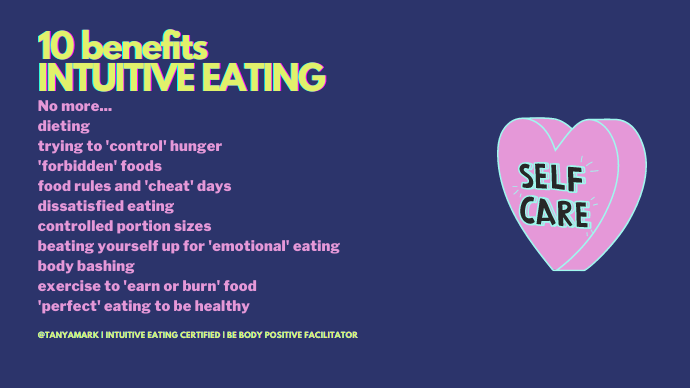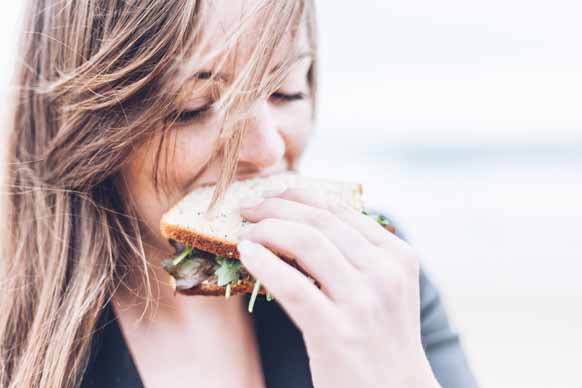What are the ten benefits of Intuitive Eating?
Learn the benefits of Intuitive Eating and how they can help you establish a healthy relationship with food and your body.
1. No more dieting
The first principle of Intuitive Eating is Reject the Diet Mentality. Why is this so important?
Diets have taught you to not listen to your body. The good news is that you can re-learn by practicing the 10 Principles of Intuitive Eating.
Diets don’t teach you how to have a healthy relationship with food which is essential to reaching “gentle nutrition” – the end goal of Intuitive Eating. Diets may give you short term weight loss but it’s almost always followed by regaining the weight and often more. Diets aren’t meant to be sustainable. Remember, diets are designed for short term “success” with repeat business as a billion dollar industry!
2. No more trying to ‘control’ hunger
The second principle of Intuitive Eating is foundational. It focuses on a critical skill that you may have lost due to diet culture – honoring your own individual hunger.
You may have learned to ignore your hunger through diets, skipping meals, intermittent fasting etc. But your body is asking for the exact opposite – to listen for your body’s cues telling you that you need energy and respond when hunger feels gentle. Why? Because once you feel ravenous (hangry!), all bets are off for eating to comfortable fullness.
♡ KEY POINT: Honoring your hunger when it’s gentle is foundational to honoring comfortable fullness.
3. No more ‘forbidden’ foods

What if having donuts (or insert your forbidden food) in your house was no big deal?
Perhaps there’s a family member in your house that may grab a donut, cookie, brownie and moves on. No guilt for eating it. No desire to eat the whole bag. This is the way a non dieter’s mind works according to research.
Through an evidence process called habituation, you too can have a healthy relationship with all foods including your ‘forbidden’ foods.
More benefits of Intuitive Eating
4. No more food rules, cheat days
Diets and eating plans are full of food rules. Once you break one by eating a “bad” food, you feel like you failed. This is madness.
Consider that every year new “plans” (diets) come out that often contradict the rules of previous diets – don’t eat fat became eat mostly fat. I remember the eat “fat free” food rules which have been replaced by eat fat according to the Keto diet. Sigh.
You don’t need a set of rules to eat healthy. Instead you will re-learn how to listen to your body and eat healthy foods for the most part, as healthy eating isn’t perfect eating.
5. No more dissatisfied, pleasureless eating
In Intuitive Eating, finding satisfaction in your eating experiences is important. Let me share an infographic to illustrate what happens when we “diet” but want a “forbidden” food.

Humans are designed to seek pleasure and avoid pain. So you will continue to seek pleasure and satisfaction until you get it (notice how much food was eaten by the dieter versus the Intuitive Eater (non dieter).
6. No more controlled portion sizes
In order to honor fullness, you first learn how to honor your hunger needs.
Next, ditch controlled portion sizes because they’re not one size fits all – meaning that your body’s unique energy needs change every day.
Instead you learn how to feel your body’s cues of comfortable fullness.

7. No more beating yourself up for ‘emotional’ eating
Emotional eating is demonized in diet culture which is deeply imbedded in Western culture as “bad” and something to fix. The truth is that we are all emotional eaters to some degree as we’ve learned since infancy to equate food with love, comfort and pleasure. So it makes perfect sense that we go to food as a quick fix to feel or not feel. The solution is to have a toolbox of coping mechanisms to go to beyond food.
And there’s one other cause of emotional eating: dieting, restricting your food. Nothing will make you feel more emotional than not getting your energy needs met and not being allowed to eat a food you love because it’s forbidden on your plan.
8. No more body bashing
Learning to respect body is critical to your self-care. Diet culture is based in body shame. It teaches you that there’s only one body size that’s healthy and that your body should never change as you move through the stages of life. All of this is BS.

Through Intuitive Eating you learn how to honor your unique diverse body with self love, not self-control. Having a healthy body image isn’t about what your body looks like. Instead, it’s about your mindset toward your body and separating your self-worth from your appearance.
9. No more exercise to “burn and earn” food
In Intuitive Eating principle 9, you learn to decouple moving your body from diet culture – as merely a means to changing your body, focusing on the scale as “success.”
Could you move your body because there are a ton of benefits of exercise that don’t have you focused on your weight such as getting stronger, feeling more empowered, energized, confident and overall improving the quality of your life?
And one my favorite benefits of Intuitive Eating is:
10. No more ‘perfect eating’ to be healthy
The final principle of Intuitive Eating is Honor Your Health – Gentle Nutrition. It’s the last guideline because you first have to learn how to listen to your body’s signals to guide you in principles 1 – 9. Now you will be able to listen for how your food choices make you feel versus external food rules.
And most of all, you learn that what you eat is just a piece of your whole health so you don’t need to eat “perfectly” because there’s a complex set of factors that affects your well-being including the social determinants of health. Healthy eating is what you eat consistently over time – for the most part eating!
* Have a question about Intuitive Eating? I’d love to hear from you, Tanya
P.S. Want to learn more? Check out The Anti-Diet is called Intuitive Eating.





![You are more than what you eat + [what you think and feel about it matters more]](https://www.tanyamark.com/wp-content/uploads/2022/08/content_mind-over-food.jpg)